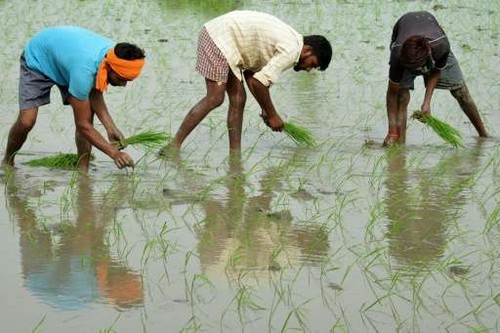 Indian farmers plant paddy seedlings in a rice field on the outskirts of Amritsar Indian farmers plant paddy seedlings in a rice field on the outskirts of Amritsar |
The study, led by Harvard University researchers, is the first to quantify the effect of global warming on the protein levels of crops. It relies on data from open field experiments in which plants were exposed to high concentrations of CO2.
Researchers calculated that by 2050, higher CO2 concentrations will sap the protein content of barley by 14.6 percent, rice by 7.6 percent, wheat by 7.8 percent, and potatoes by 6.4 percent. Global dietary information from the United Nations was used to calculate the impact on people who live dangerously close to the edge when it comes to getting enough protein.
Other research has shown that rising CO2 will cut key minerals like iron and zinc in staple crops, leading to further nutritional deficiencies worldwide.
76 percent of the people on Earth rely on plants for most of their daily protein, particularly in poor areas of the globe.
According to the report, if CO2 levels continue to rise as projected, the populations of 18 countries may lose more than 5 percent of their dietary protein by 2050 due to a decline in the nutritional value of rice, wheat, and other staple crops. The hardest hit areas are expected to be sub-Saharan Africa, where millions already don't get enough protein in their diets, and South Asia where rice and wheat are common staples.
Researchers say they still don't understand how or why carbon dioxide emissions sap protein and other nutrients from plants, but the mystery is one that could have devastating consequences across the globe.
Researchers said possible solutions include cutting carbon emissions, supporting more diverse diets, enriching the nutritional content of staple crops, and breeding crops that are less sensitive to the harmful effects of CO2.
Economists say countries should ramp up the cost of carbon emissions to as much as USD 100 per metric ton by 2030 to stop catastrophic global warming. European Union carbon prices stand at just under 6 USD per ton. They say prices should rise to 50-100 USD by 2030 to give businesses and governments an incentive to lower emissions even when fossil fuels are cheap. The Trump administration has rejected calls to introduce a carbon tax in the United States, saying it would cost jobs.